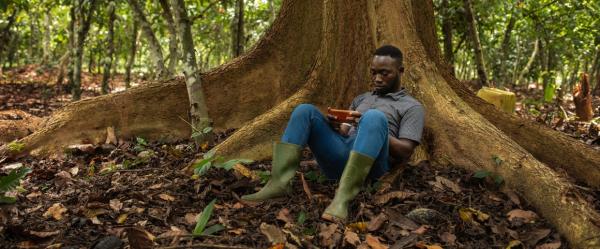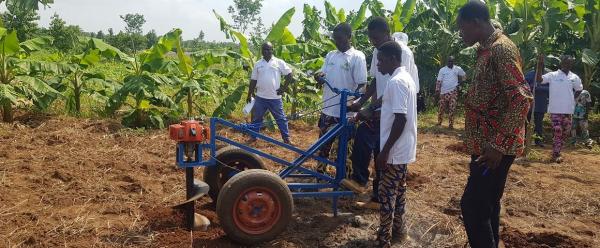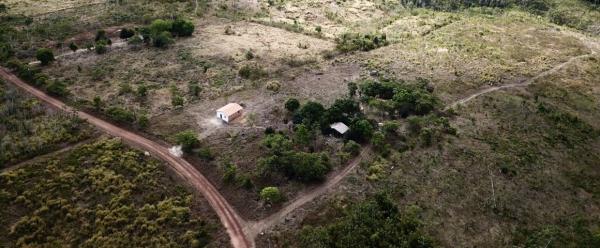Call to action 25 November 2025
- Home
- CIRAD news
- News
- Neglected tropical diseasesOne Health
Neglected tropical diseases: support for the One Health approach
_MTN_S.molia.JPG)
Actions to control neglected tropical diseases depend on funding that could be compromised by the health and economic crisis linked to COVID-19 © S. Molia, CIRAD
Neglected tropical diseases concern more than a billion people worldwide. Included in the agenda of the Sustainable Development Goals (SDGs), they especially affect low-income populations. WHO has identified 17 of these diseases, including rabies, dengue, leprosy and trypanosomiasis*.
“Rabies is still responsible for more than 50 000 deaths per year, even though we have the tools to eradicate it”, says Sophie Molia, a veterinary epidemiologist at CIRAD and co-author of the study. “Control of neglected tropical diseases suffers from a lack of political will and resources. These diseases nevertheless have very serious economic and social impacts, which could be avoided”.
According to 98 % of the 171 experts surveyed as part of a study by CIRAD, IRD, INSERM, Institut Pasteur, ANSES and the University of Bourgogne Franche-Comté, widespread implementation of the One Health approach to control these diseases would be a key advantage. The One Health approach links human, animal and ecosystem health. But beyond interdisciplinary research, this approach also encourages the development of more general solutions, building bridges between the various networks and sectors at different levels.
In particular, the authors of the study recommend:
Breaking down disciplinary silos: human health is not the only answer
The ongoing COVID-19 pandemic has shown that medicine cannot be the only answer to the emergence of zoonotic diseases, which are transmitted from animals to humans. Although not all neglected tropical diseases are zoonoses, some are: rabies, trypanosomiasis, and cysticercosis caused by the pork tapeworm (worm of the small intestine). In this context, the contribution of veterinarians and wildlife experts is essential.
“Dogs, rodents, ticks, mosquitoes, etc., several species act as reservoirs, hosts or vectors of pathogens”, says Sophie Molia. “The example of rabies is particularly telling: it would be more effective and less costly to vaccinate dogs than to treat human patients after being bitten”.
The respondents also highlight the importance of disciplines linked to water treatment and hygiene. Finally the social sciences often prove necessary to adapt strategies to local contexts and needs.
Encouraging general approaches: thinking less in terms of individual diseases
Ebola, AIDS, malaria, tuberculosis, etc., some diseases are the object of major dedicated actions and funding programmes. Although control of these diseases is necessary, it should not overshadow the importance of more general measures.
According to Sophie Molia, “several neglected tropical diseases are linked to hygiene and poverty. Improving water treatment, increasing universal health coverage, and developing and providing diagnostic tools and basic treatments in the field would all help to dramatically reduce the prevalence of several different diseases. One of the main obstacles to these general measures is the priority given to health programmes that focus on one or a small number of diseases”.
Strengthening multi-level actions: for localised solutions
“International programmes are of paramount importance, if only to make vaccines affordable for the poorest populations”, says Sophie Molia. “However, disease control strategies cannot ignore the reality in the field. These strategies must be adapted to the needs of local populations”.
Fly traps to control trypanosomiasis are ignored by farmers who are too busy dealing with foot and mouth disease. Ebola vaccination centres are poorly equipped to deal with childhood diarrhoea epidemics. And large amounts are spent on the construction of latrines that go unused. The past failures of control campaigns call for solutions that are adapted to local contexts, systems and needs.
Developing scientific networks: knowledge transfer is central to disease control
Set up in 2016, the French-speaking Network on Neglected Tropical Diseases works to collate research that is fragmented between many different laboratories and actors. This Federation has enabled the launch of transdisciplinary projects, but has also facilitated discussions with other networks, British, Canadian, Swiss, German, Japanese, etc.
The scientific research conducted within these networks improves knowledge of neglected tropical diseases. These networks also help to communicate at the policy level on the importance of transdisciplinary research.
Improving coordination between the different sectors: for shared budgets
The English-speaking countries in Africa pioneered the launch of interministerial platforms, to better coordinate actions between health, agricultural and environmental sectors. However, the findings of the study show the need to develop these systems and to make them more operational in the French-speaking countries.
“One Health” funding is notoriously hard to obtain. In terms of both research and control, the existing silos concern different donors for: programmes focusing only on human health; actions on surveillance, wildlife, water treatment, etc.
By increasing the confusion surrounding priorities, the separation of budgets thus limits the effectiveness of projects and the development of more general approaches.
At present, actions to control neglected tropical diseases depend on funding that could be compromised by the health and economic crisis linked to COVID-19. The priority given to private sector profitability also hampers the provision of treatments and vaccines for predominantly poor populations. The need to continue the fight against neglected tropical diseases is therefore urgent, especially as progress in recent years means the eradication of some of these diseases is one step closer.
171 experts questioned about their research, monitoring and control activities for neglected tropical diseases
The survey was launched within the French-speaking Network on Neglected Tropical Diseases. The 171 participants in the study work in human and public health research institutes, animal and agricultural health research institutes, universities, health ministries, hospitals, veterinary schools, international organisations, and ministries of agriculture and livestock farming. They come from France, Côte d’Ivoire, Niger, Guinea, Switzerland, Burkina Faso, Democratic Republic of the Congo, Algeria, Madagascar, Belgium, Senegal, Benin, Comoros, United Kingdom and New Zealand.
* According to WHO, neglected tropical diseases include: dengue, rabies, blinding trachoma, Buruli ulcer, endemic treponematoses (yaws), leprosy (Hansen disease), Chagas disease, human African trypanosomiasis (sleeping sickness), leishmaniasis, cysticercosis, dracunculiasis (guinea-worm disease), echinococcosis, foodborne trematode infections, lymphatic filariasis, onchocerciasis (river blindness), schistosomiasis (bilharziasis), and soil-transmitted helminthiases (intestinal worms).



























